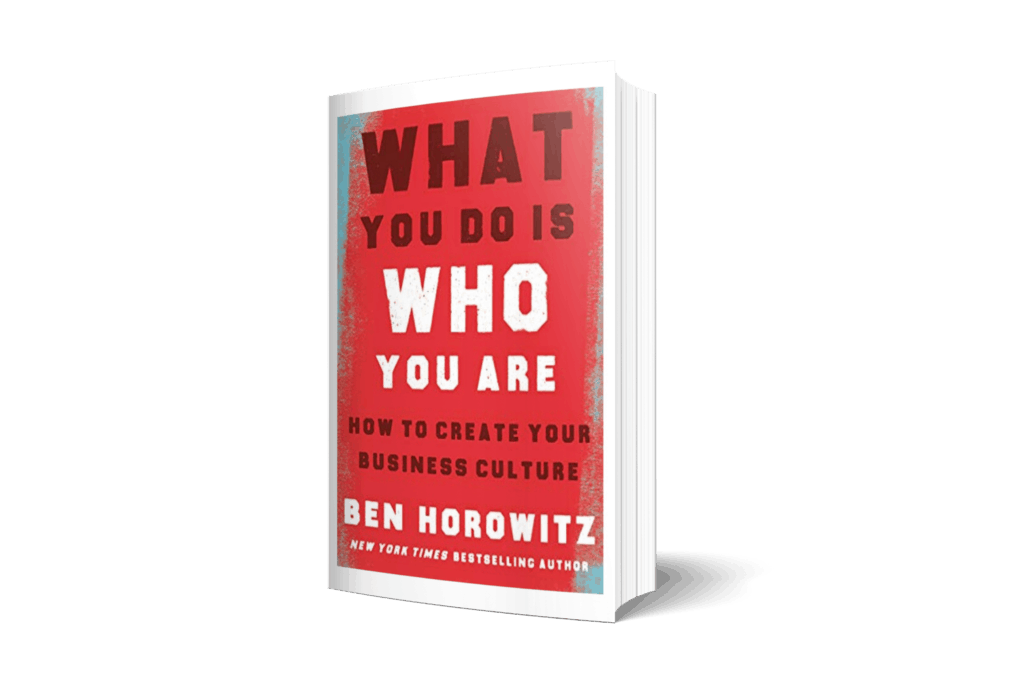What You Do Is Who You Are
How to Create Your Business Culture
Author: Ben Horowitz

No available rating

👍GetAbstract Rating: 8/10

PROJECTMANAGEMENT.CO QUICK REVIEW
This is a sample place holder
Book Summary Preview
Defining Your Culture
Do you want to be like Apple and spend $5 billion on a state-of-the-art corporate headquarters to underline your commitment to cutting edge design and environmental awareness, or do you want to be like Wal-Mart and furnish your headquarters with sample furniture submitted by manufacturers seeking to sell their wares in your stores?
To explain the challenges in making such choices, Horowitz avoids the standard practice of interviewing current successful executives, choosing instead to identify four historical figures to support his proposal: Haiti’s Toussaint Louverture who led the only successful slave revolt in history; Japanese Samurai and their focus on virtues (what you do) over values (what you believe); Genghis Khan’s ability to create “an innovative and inclusive meritocracy,”; and Shaka Senghor, the powerful gang leader in the 1990’s Michigan prison system.
The author makes a deliberate choice to avoid survivorship bias––the incorrect assumption that successful companies owe their success to their unique cultures. By exploring historical events rather than reverse-engineering existing companies, Horowitz is able to emphasize that how each figure saw their respective culture was as important as the decisions made to strengthen it, often in the face of overwhelming odds. Louverture succeeded in reprogramming a culture of an entire nation; Khan was imprisoned by his own tribe as a youth and yet managed to earn the right to lead and transform them; Senghor transformed a disparate crew of outcasts into a cohesive team; and the Samurai built a warrior class that ruled Japan for seven centuries.
Once these stories are fully developed, the author then draws parallels with modern business leaders whose success is shown to mirror the decisions made by those historical figures. The first African American CEO of McDonald’s, Don Thompson, for example, pursued the same objective of cultural inclusiveness as Genghis Khan. Reed Hastings at Netflix and Travis Kalanick at Uber applied the same cultural techniques as Louverture. The clear connections show both the value of reading history, and the merit of enough humility to realize that much of what you need for successful leadership can be found there.
What You Do Is Who You Are offers a creative exploration of historical figures set against modern business leaders to underscore the importance of paying attention to your organizational culture.
About The Author & Review
About The Author:
Ben Horowitz, a leading venture capitalist, modern management expert, and New York Times bestselling author, combines lessons both from history and from modern organizational practice with practical and often surprising advice to help executives build cultures that can weather both good and bad times.
Review:
Your company will develop a culture with or without you. If that culture isn’t purposeful, it may well deteriorate into a mess of questionable decision-making and an even more questionable value system. The damage this will do to your strategic planning and problem-solving could be fatal.
In his new book What You Do Is Who You Are: How to Create Your Business Culture, author Ben Horowitz argues that you must take responsibility for the creation and development of your organizational culture. Leading by example won’t get it done, and if you just assume that your leadership team will make it happen, you’ll be left with “a hodgepodge of different cultures fostered under different managers.”
To prevent this from happening, Horowitz argues, you must take on the daunting task of figuring out not only what your aspirational culture looks like, but also the path you will need to follow to get there.

